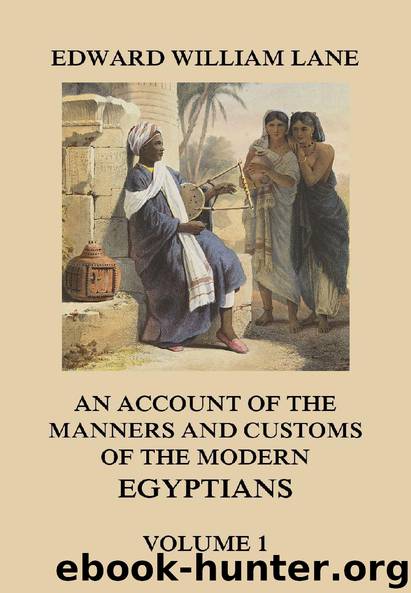An Account of The Manners and Customs of The Modern Egyptians, Volume 1 by Edward William Lane

Author:Edward William Lane [Lane, Edward William]
Language: eng
Format: epub
Tags: Geschichte
Publisher: Jazzybee Verlag
Published: 2017-07-19T22:00:00+00:00
Note: It is a common belief in Egypt, that, if any one make a marriage-contract in the month of Moharram, the marriage will be unhappy, and soon dissolved; wherefore, few persons do so. The most propitious period is the month of Showwál.
The making this contract is commonly called “ketb el-kitáb” (or the writing of the writ): but it is very seldom the case that any document is written to confirm the marriage, unless the bridegroom is about to travel to another place, and fears that he may have occasion to prove his marriage where witnesses of the contract cannot be procured. Sometimes the marriage-contract is concluded immediately after the arrangement respecting the dowry, but more generally a day or two after. On the day appointed for this ceremony, the bridegroom, again accompanied by two or three of his friends, goes to the house of the bride, usually about noon, taking with him that portion of the dowry which he has promised to pay on this occasion. He and his companions are received by the bride's wekeel; and two or more friends of the latter are usually present. It is necessary that there be two witnesses (and those must be Muslims) to the marriage-contract, unless in a situation where witnesses cannot be procured. All persons present recite the Fát'hah; and the bridegroom then pays the money. After this, the marriage-contract is performed. It is very simple. The bridegroom and the bride's wekeel sit upon the ground, face to face, with one knee upon the ground, and grasp each other's right hand, raising the thumbs, and pressing them against each other. A fikee is generally employed to instruct them what they are to say. Having placed a handkerchief over their jointed hands, he usually prefaces the words of the contract with a “khutbeh,” consisting of a few words of exhortation and prayer, with quotations from the Kur-án and Traditions, on the excellence and advantages of marriage. He then desires the bride's wekeel to say, “I betroth [or marry] to thee, my daughter or the female who has appointed me her wekeel], such a one [naming the bride], the virgin [or the adult virgin], for a dowry of such an amount.” (The words “for a dowry,” &c., are sometimes omitted.) The bride's wekeel having said this, the bridegroom, prompted in the same manner by the fikee, says, “I accept from thee her betrothal [or marriage] to myself, and take her under my care, and bind myself to afford her my protection; and ye who are present bear witness of this.” The wekeel addresses the bridegroom in the same manner a second and a third time; and each time, the latter replies as before. Both then generally add, “And blessing be on the Apostles, and praise be to God, the Lord of the beings of the whole world: amen:” after which, all present again repeat the Fát'hah. It is not always the same form of “khutbeh” that is recited on these occasions: any form
Download
This site does not store any files on its server. We only index and link to content provided by other sites. Please contact the content providers to delete copyright contents if any and email us, we'll remove relevant links or contents immediately.
| Africa | Americas |
| Arctic & Antarctica | Asia |
| Australia & Oceania | Europe |
| Middle East | Russia |
| United States | World |
| Ancient Civilizations | Military |
| Historical Study & Educational Resources |
Goodbye Paradise(3810)
Men at Arms by Terry Pratchett(2838)
Tobruk by Peter Fitzsimons(2518)
Borders by unknow(2315)
Arabs by Eugene Rogan(2299)
Pirate Alley by Terry McKnight(2221)
More Than Words (Sweet Lady Kisses) by Helen West(1867)
Belonging by Unknown(1858)
It's Our Turn to Eat by Michela Wrong(1731)
The Biafra Story by Frederick Forsyth(1656)
The Source by James A. Michener(1613)
Botswana--Culture Smart! by Michael Main(1602)
Coffee: From Bean to Barista by Robert W. Thurston(1546)
A Winter in Arabia by Freya Stark(1538)
Gandhi by Ramachandra Guha(1532)
The Falls by Unknown(1527)
Livingstone by Tim Jeal(1489)
The Shield and The Sword by Ernle Bradford(1409)
Africa: Altered States, Ordinary Miracles by Richard Dowden(1385)
